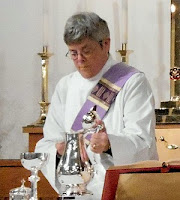Click here for Part 1 of this series on the Diaconate.
The
transitional diaconate, a period of training within a parish, has been in place
for many years, while the vocational diaconate died out in the first century.
An ordination to the Sacred Order of Deacons meant a period of training within
a parish, usually from 6 months to a year, and leading to ordination to the
priesthood. This was, and still is, true of both the Roman Catholic as well as
the Episcopal Church. Our Lutheran brethren have no such order, and other
mainline Protestant denominations consider deacons to be an office rather than
a clerical order.
Beginning in
the 1840's and extending to the 1930's, the Episcopal Church ordained men to
serve as missionaries to isolated areas and indigenous people. They
remained deacons for the duration of their ministries. From 1885 through 1970,
Episcopal bishops "set apart" women as deaconesses, by prayer, but
occasionally by the laying on of hands, to care for the sick, the poor and the
needy. (A community of deaconesses
served in the Diocese of Southwestern Virginia, educating the children of
miners through the late 1960's). Men were ordained from 1952-1970 as
"perpetual deacons", to serve parishes as sacramental and pastoral
assistants in the booming post WWII church. These were generally older men
serving in their home parishes and were not deployed to other parishes. They
were trained and supervised by their parish priest.
Vatican II renewed
the "permanent diaconate" as a permanent position for men, including
those who were married. The Episcopal
Church renewed the order of deacon in 1970, and citing the biblical record, for
the first time allowed women to be ordained as deacons. The remaining Episcopal
deaconesses were then deemed deacons, and the office of deaconess was abolished
by canon law. After much debate, the traditional period of temporary
transitional diaconate prior to priesthood was also retained.
Beginning in
1971, vocational deacons generally served in social care ministries outside
of a parish. Some of these were women who were seminary trained with a
priestly call. Many others, both men and women, had a liturgical base in a
parish, with their identities firmly based on their work outside the church.
The
ordination of women to the priesthood, approved in 1976, led the way for the
vocational diaconate to mature into its own identity, as the different calls to
ordained ministry were recognized during periods of discernment. Whether a
transitional or a vocational deacon, ordination is to word and service. (Only
priests are ordained to the sacraments of absolution, blessing and
consecration). The difference at that point is that vocational deacons are
to earn their living in the world, while a transitional deacon is employed by
the church from the beginning of their ordained life, and the emphasis is on
training for the priesthood.
Many
vocational deacons work in social or institutional ministries---counseling,
school, college, hospital or prison, police, fire
department chaplaincies; HIV/AIDS, domestic violence and rape crisis
agencies; working with the homeless, the addicted, refugees, at risk
children. Other sell insurance or real estate, teach school, work in
offices as administrators, newspaper reporters or are musicians. My
daughter-in-law Elissa's father, John Earl, is both a vocational deacon and a
family practice physician, providing free healthcare to those unable to pay, or
without health insurance.
There are
instances of deacons working in the church professionally, highly trained in
areas of diocesan leadership, counseling, pastoral care, Christian education,
youth or college ministries, or administering social action ministries. It is the work of a deacon within a parish to
enlist, train, and support the baptized in ministries of care, or to lead the
church's efforts in social action and justice issues.
A deacon
working in the world, ministering to "those whom it is easy to
forget", is charged with bringing the concerns of the world to the church,
and inviting a response. The church in
any time, is called to be the conscience of our world, and to speak truth to
power, while taking the Good News of Jesus Christ and His love to a broken
world.
Katherine T. Gray, Chaplain, Riverside
Hospice


No comments:
Post a Comment